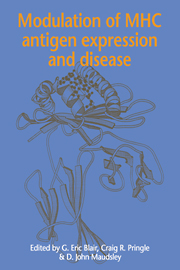Book contents
- Frontmatter
- Contents
- List of contributors
- Preface
- List of abbreviations
- 1 General introduction to the MHC
- 2 Organization of the MHC
- 3 Interactions of cytokines in the regulation of MHC class I and class II antigen expression
- 4 Control of MHC class I gene expression
- 5 Control of MHC class II gene expression
- 6 Modulation of MHC antigen expression by viruses
- 7 Modulation of MHC antigen expression by retroviruses
- 8 Modulation of MHC class I antigen expression in adenovirus infection and transformation
- 9 MHC expression in HPV-associated cervical cancer
- 10 Inhibition of the cellular response to interferon by hepatitis B virus polymerase
- 11 Cellular adhesion molecules and MHC antigens in cells infected with Epstein-Barr virus: implications for immune recognition
- 12 Effect of human cytomegalovirus infection on the expression of MHC class I antigens and adhesion molecules: potential role in immune evasion and immunopathology
- 13 Oncogenes and MHC class I expression
- 14 Mechanisms of tumour cell killing and the role of MHC antigens in experimental model systems
- 15 Manipulation of MHC antigens by gene transfection and cytokine stimulation: a possible approach for pre-selection of suitable patients for cytokine therapy
- 16 Overexpression of MHC proteins in pancreatic islets: a link between cytokines, viruses, the breach of tolerance and insulindependent diabetes mellitus?
- 17 The role of cytokines in contributing to MHC antigen expression in rheumatoid arthritis
- 18 Expression of an MHC antigen in the central nervous system: an animal model for demyelinating diseases
- Index
12 - Effect of human cytomegalovirus infection on the expression of MHC class I antigens and adhesion molecules: potential role in immune evasion and immunopathology
Published online by Cambridge University Press: 11 September 2009
- Frontmatter
- Contents
- List of contributors
- Preface
- List of abbreviations
- 1 General introduction to the MHC
- 2 Organization of the MHC
- 3 Interactions of cytokines in the regulation of MHC class I and class II antigen expression
- 4 Control of MHC class I gene expression
- 5 Control of MHC class II gene expression
- 6 Modulation of MHC antigen expression by viruses
- 7 Modulation of MHC antigen expression by retroviruses
- 8 Modulation of MHC class I antigen expression in adenovirus infection and transformation
- 9 MHC expression in HPV-associated cervical cancer
- 10 Inhibition of the cellular response to interferon by hepatitis B virus polymerase
- 11 Cellular adhesion molecules and MHC antigens in cells infected with Epstein-Barr virus: implications for immune recognition
- 12 Effect of human cytomegalovirus infection on the expression of MHC class I antigens and adhesion molecules: potential role in immune evasion and immunopathology
- 13 Oncogenes and MHC class I expression
- 14 Mechanisms of tumour cell killing and the role of MHC antigens in experimental model systems
- 15 Manipulation of MHC antigens by gene transfection and cytokine stimulation: a possible approach for pre-selection of suitable patients for cytokine therapy
- 16 Overexpression of MHC proteins in pancreatic islets: a link between cytokines, viruses, the breach of tolerance and insulindependent diabetes mellitus?
- 17 The role of cytokines in contributing to MHC antigen expression in rheumatoid arthritis
- 18 Expression of an MHC antigen in the central nervous system: an animal model for demyelinating diseases
- Index
Summary
Introduction
Human cytomegalovirus (CMV) is a ubiquitous agent that rarely causes disease in healthy individuals but is an important pathogen in the immunocompromised or the immunologically immature foetus. Individuals at high risk are those with deficiencies in cell-mediated immunity and it is, therefore, believed that in the immunocompetent host the cell-mediated immune response is the most important form of defence against CMV (Grundy, 1991). In the immunocompromised, CMV infection can be associated with a wide range of symptoms. The most serious complication in allogeneic transplant recipients is CMV interstitial pneumonitis, which is associated with a high mortality (Meyers, Flournoy & Thomas, 1982), and the virus remains the most important infectious cause of death following bone marrow transplantation. In AIDS patients, CMV can cause sight-threatening retinitis (Collaborative DHPG Treatment Study Group, 1986) and serious disease throughout the gastrointestinal tract. Congenital CMV infection can be associated with disseminated disease, including in the CNS, and the virus is an important cause of deafness and mental retardation (Alford et al., 1990). Thus, CMV causes disease in many organ systems in various patient populations. However, even in the immunocompetent host, the virus is not eradicated from the body following primary infection and can persist in a latent form throughout life. Hence, whilst the normal host immune response is usually able to prevent disease associated with primary CMV infection, the virus ultimately evades the host response and becomes latent.
- Type
- Chapter
- Information
- Modulation of MHC Antigen Expression and Disease , pp. 278 - 294Publisher: Cambridge University PressPrint publication year: 1995



